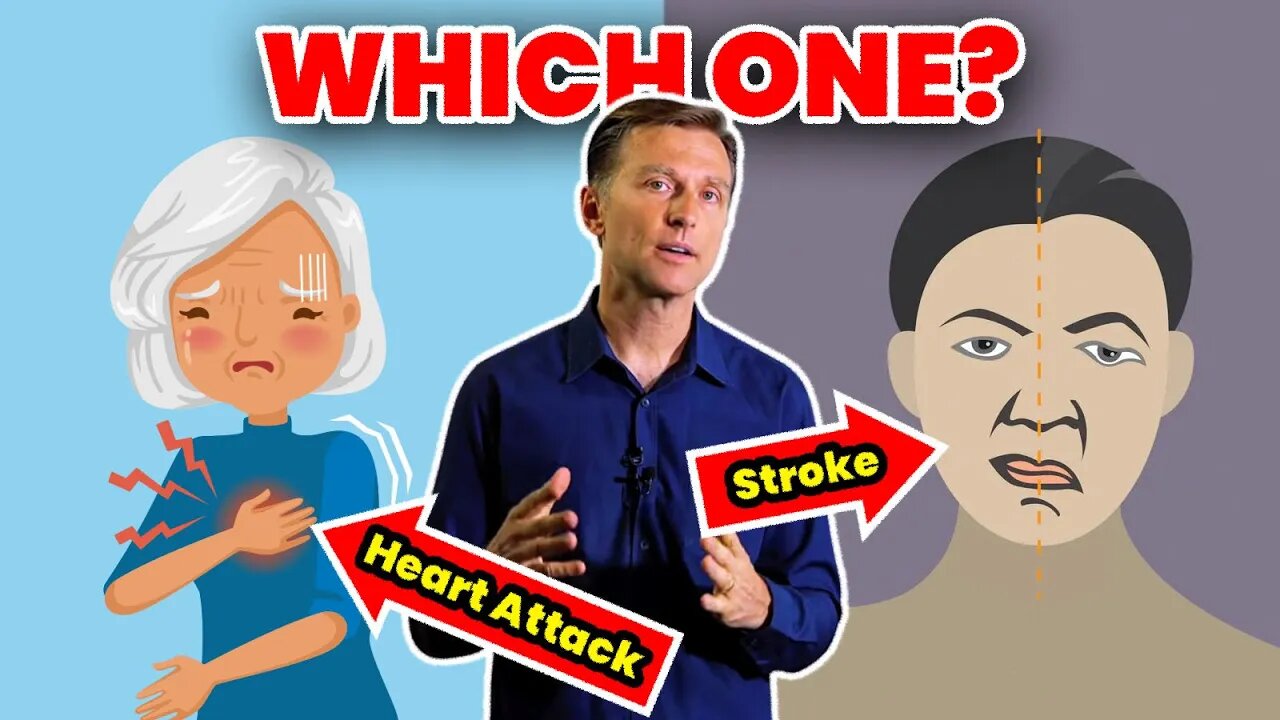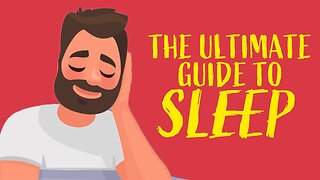Premium Only Content

If You HAD to Pick One: Stroke or Heart Attack?
Which is worse, a stroke or a heart attack? Watch to find out.
In this video, we’re going to talk about strokes and heart attacks. If you HAD to pick one, would you choose a stroke or a heart attack? Let me know in the comments below.
HEALTHY KETOGENIC DIET AND INTERMITTENT FASTING PLAN ➜ ➜
https://www.drberg.com/healthy-keto-and-intermittent-fasting-plan
Timestamps
0:00 Introduction: Stroke or Heart Attack: Which Would You Rather Have?
0:16 What is a stroke?
0:30 What is a heart attack?
1:35 Signs of stroke
2:48 Why strokes and heart attacks are caused by the same things
4:11 Signs arterial inflammation
5:24 Three ways to reduce inflammation
6:49 Share your success story!
Let’s take a look at which is worse.
What is a stroke? A stroke is either a blood clot or plaquing that has dislodged somewhere in your body, stopping blood flow.
Signs of a stroke:
F - Face is drooping on one side
A - Arm weak on one side
S - Speech difficulty
T - Time (no time to waste)
What is a heart attack? A heart attack is either a blood clot or plaquing that has dislodged in your heart, stopping blood flow to heart muscle tissue. Did you know that 48% of the US population has a heart problem?
Strokes and heart attacks are virtually the same—they are just in different locations.
I would personally rather have a heart attack than a stroke. Here’s why.
A stroke can paralyze half of your body, leading to difficulties getting around and doing basic tasks.
A stroke has a 28% mortality rate, while a heart attack has a 12% mortality rate.
Did you know what the #1 cause of death is heart attack, and the 5th leading cause of death is stroke?
It’s important to get a CAC (coronary artery calcification) test. This is one of the best predictors of heart attacks.
Strokes and heart attacks are often caused by the same thing: inflammation.
Inflammation causes damage to your arteries. Your body then uses cholesterol and calcium as a Bandaid to patch up damaged arterial tissue. In turn, this can lead to artery blockages.
A high-carb diet and the overconsumption of omega-6 fatty acids are the biggest causes of inflammation in the body.
These are some signs of arterial inflammation:
• Protruding belly
• Swollen face
• Constant carbohydrate consumption
The best things for lowering inflammation are:
• Vitamin E (tocotrienol)
• Healthy Keto (low carbs)
• Intermittent fasting
Dr. Eric Berg DC Bio:
Dr. Berg, age 57, is a chiropractor who specializes in Healthy Ketosis & Intermittent Fasting. He is the author of the best-selling book The Healthy Keto Plan, and is the Director of Dr. Berg Nutritionals. He no longer practices, but focuses on health education through social media.
Follow Me On Social Media:
Facebook: https://bit.ly/FB-DrBerg
Instagram: https://bit.ly/IG-DrBerg
Anchor: https://bit.ly/Anchor-DrBerg
TikTok: https://bit.ly/TikTok-DrBerg
Send a Message to his team: https://m.me/DrEricBerg
Disclaimer:
Dr. Eric Berg received his Doctor of Chiropractic degree from Palmer College of Chiropractic in 1988. His use of “doctor” or “Dr.” in relation to himself solely refers to that degree. Dr. Berg is a licensed chiropractor in Virginia, California, and Louisiana, but he no longer practices chiropractic in any state and does not see patients so he can focus on educating people as a full time activity, yet he maintains an active license. This video is for general informational purposes only. It should not be used to self-diagnose and it is not a substitute for a medical exam, cure, treatment, diagnosis, and prescription or recommendation. It does not create a doctor-patient relationship between Dr. Berg and you. You should not make any change in your health regimen or diet before first consulting a physician and obtaining a medical exam, diagnosis, and recommendation. Always seek the advice of a physician or other qualified health provider with any questions you may have regarding a medical condition.
#keto #ketodiet #weightloss #ketolifestyle
Thanks for watching. I hope this helped explain which is worse, a stroke or a heart attack. I’ll see you in the next video. stroke risk stroke prevention prevent strokes ischemic stroke atrial fibrillation
-
 8:53
8:53
Dr. Eric Berg
7 days agoHow Not Sleeping Is Killing You: SLOWLY
7.3K13 -
 4:13:39
4:13:39
Nobodies Gaming
10 hours ago $18.61 earnedNobodies : Rumble Gaming MARVEL RIVALS
105K7 -
 24:08
24:08
MYLUNCHBREAK CHANNEL PAGE
1 day agoUnder The Necropolis - Pt 4
95.5K29 -
 19:52
19:52
Adam Does Movies
7 hours ago $2.93 earnedEmilia Pérez Movie Review - It's Uniquely Awful
32.5K3 -
 20:07
20:07
BlackDiamondGunsandGear
13 hours agoSPRINGFIELD ECHELON COMPACT / NOT GOOD
37.8K3 -
 1:05:06
1:05:06
Man in America
13 hours agoThe Terrifying Truth Behind Chemical Fog, Wildfire Smoke & Chemtrails w/ Dr. Robert Young
32.9K44 -
 2:54:47
2:54:47
Tundra Tactical
6 hours ago $5.28 earnedSHOT Show 2025 Wrap Up!! On The Worlds Okayest Gun Live Stream
38.5K -
 LIVE
LIVE
Right Side Broadcasting Network
1 day agoLIVE REPLAY: President Donald J. Trump Holds His First Rally After Inauguration in Las Vegas - 1/25/25
3,221 watching -
 2:55:24
2:55:24
Jewels Jones Live ®
1 day agoWEEK ONE IN REVIEW | A Political Rendezvous - Ep. 107
120K41 -
 1:33:29
1:33:29
Michael Franzese
1 day agoTrump Wastes No Time: Breaking Down Trump’s First Week Executive Orders | LIVE
130K94